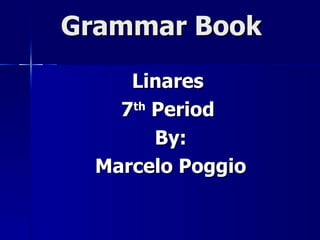Grammar book
- 1. Grammar Book Linares 7 th Period By: Marcelo Poggio
- 2. Table Of Contents Page 1-Present(ar,er,ir) Page 2-Stem Changers Page 3-Irregular âyoâ Page 4-Saber vs. Conocer Page 5-Reflexives Page 6-âseâ Impersonal Page 7-Dipthongs Page 8-Verbs like-ger/gir, uir/guir, cer/cir Page 9-hace + _ + que + _ Page 10-Imperfecto
- 3. Present(ar,er,ir) Ar: O As A Amos Ãis An 1 Er: o es e emos ÃĐis en Ir: o es e imos Ãs en
- 4. Stem Changers Combine verbs in the root A. âeâ ï âieâ B. âeâ ï âIâ C. âoâ ï âueâ D. âuâ ï âueâ Do not combine nosotros nor vosotros
- 5. Irregular âyoâ â goâ verbs- Caer, decir, oir, poner, hacer, tener, traer, venir. â zcoâ verbs- conocer, producir, conducir, y los demÃĄs- ser, estar, ir, ver, saber, dar
- 6. Saber vs. Conocer Saber- To know a fact or to know how to do something. yo sÃĐ nosotros sabemos tu sabes vosotros sabÃĐis ÃĐl sabe ellos saben Conocer- To know someone or to be familiar with someone . yo conozco nosotros conocemos tu conoces vosotros conocÃĐis ÃĐl conoce ellos conocen
- 7. Reflexives A verb is reflexive when the subject and the object are the same. For Example: I hurt myself When a verb is reflexive, the infinitive ends in "se."
- 8. â seâ Impersonal The Impersonal se is used with a third person singular verb. (one, you, people, or they). Used to indicate people in general, not one person. For Example: ÂŋCÃģmo se dice rojo en espaÃąol? How does one say red in Spanish?
- 9. Dipthongs The strong or weak vowels in the word next to each other A, e, o are the strong vowel sounds I, u, y are the weak vowel sounds
- 10. Verbs like-ger/gir, uir/guir, cer/cir Ger or Gir change G-J in the âyoâ form. For Example: Exigir (to demand) Exi j o Exiges Exige Exigimos Exig Ãs Exigen Cer/cir If the verb ends in a vowel add z before the c in the yo form only. If the verd ends in a consonant change the c to a z in the yo form only
- 11. hace + _ + que + _ Hago-The only irregular Haces Hace Hacemos Hacen The yo form is the only irregular
- 12. Imperfecto 1. What was happening, happened, used to happen. 2. To describe people or things in the past. 3. To describe a state of mind, an opinion, or a feeling in the past. 4. To express the time of day in the past. 5. When describing an action that was in the process of happening. 6. To set the stage, describe, a situation or setting.
- 13. Preterite Tense e i aste iste o o amos imos aron ieron
- 14. Spock Hacer- hice, hiciste, hizo, hicimos, hicieron Ir- fui, fuiste, fue, fuimos, fueron Ser- fui, fuiste, fue, fuimos, fueron Dar- I, iste, io, imos, ieron Ver- I, iste, io, imos, ieron
- 15. Cucaracha Andar anduve e Estar estuv iste Poder pud io Poner pus imos Querrer quis ieron Saber sup Tener tuv Venir vin Conducir conduj Producir produj Traducir traduj Traer traj Decir dij
- 16. Snake/Snakey Stem changers & Y changers Snake: dormir Dormiâ dormimos Dormiste Durmioâ durmieron Snakeys Leer Leiâ leimos Leiste Leyoâ leyeron
- 17. Trigger Words Ayer Anoche Anteayer La semana pasada
- 18. El Futuro Infinitive & eâ, aâs, aâ, emos, aân Add it on end. Vivir -> vivireâ Ir + a + infinitive
- 19. Irregular Futoro Decir-dir-to say haber-habr-there to be [impersonal]; to have [helping verb] Hacer-har-to make,do Poder-podr-to put, place, set
- 20. Por Portal- the idea of passing through Portugal- general rather than specific location â porâever- how long something lasts Porpose- the case of something Import/export- an exchange Im por, pay for me- doing something in place of or instead of someone else Transâporâtation- a mean of transportation
- 21. Para Surprise paratay- to whom something is done Parangari- destination Paradoname- to express an opinion Comâparaâson- to contrast or compare Paramedic- to express the idea of a deadline.
- 22. Condicional | Futuro Condicional Ãa Ãas Ãa Ãamos Ãais Ãan Futuro ÃĐ ÃĄs ÃĄ emos ÃĐis ÃĄn
- 23. Preterite | Imperfecto Preterite ÃĐ aste Ãģ amos asteis aron Imperfecto aba abas aba ÃĄbamos abais aban


















![Irregular Futoro Decir-dir-to say haber-habr-there to be [impersonal]; to have [helping verb] Hacer-har-to make,do Poder-podr-to put, place, set](https://image.slidesharecdn.com/grammarbook-120214122100-phpapp01/85/Grammar-book-19-320.jpg)



